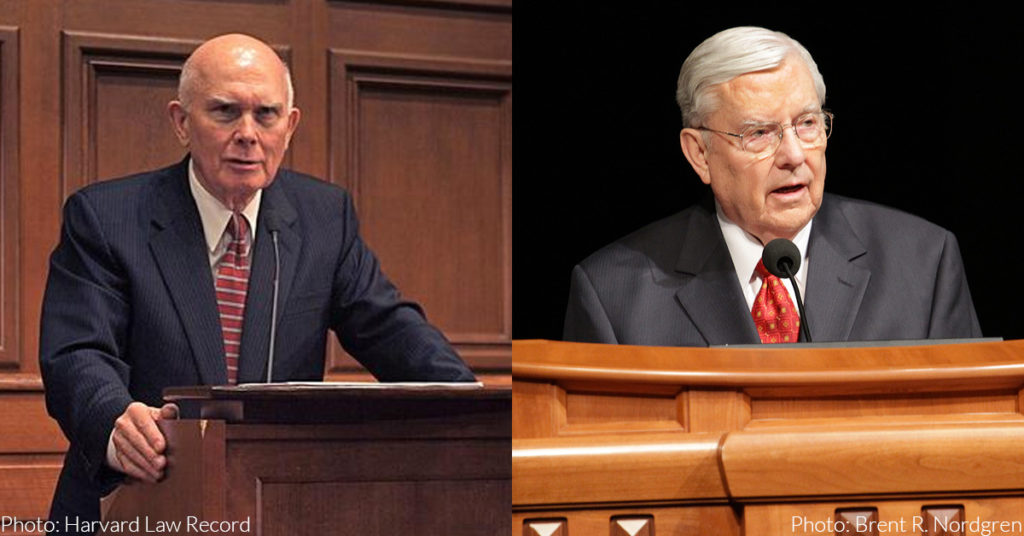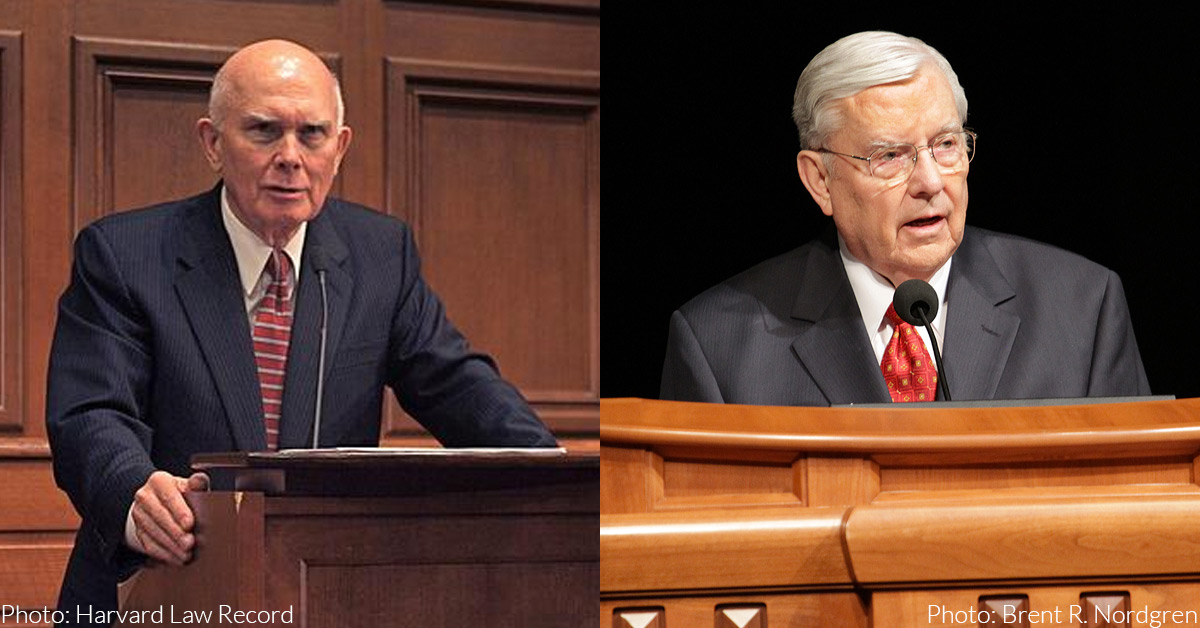Elders Oaks and Ballard Leave Many Questions Unanswered at Young Single Adult Broadcast

By Joel McDonald
Broadcasting to the world on November 19th, 2017, from Logan, Utah, Elders Dallin H. Oaks and M. Russell Ballard, members of the Quorum of the Twelve Apostles of The Church of Jesus Christ of Latter-day Saints, hosted a “Face to Face” event for Young Single Adults, members of the Church who are not married and are between the ages of 18 and 30. This broadcast was similar to a recent devotional address that Elder Ballard delivered at BYU just 5 days earlier on November 14, 2017, in that answers were given to questions submitted prior to the broadcast by young single adult members of the LDS Church. Over 4,000 questions were submitted through various channels, including over 3,500 questions submitted through comments on the broadcast’s page on lds.org.
Questions about Same-Gender Attraction
Two questions relating to the same-gender attraction were asked about twenty minutes into the broadcast. While the questions specifically asked about “same-gender attraction,” Elder Ballard’s answers were similar to those he gave in his BYU devotional in answer to questions asked on “LGBT” issues. It is likely that the answers given by Elders Oaks and Ballard regarding these questions on “same-gender attraction” are inclusive of the entire LGBT community.
Question: “We’ve had a number of questions come in about same-gender attraction. These two are pretty representative of what we have received. A young single adult from Brazil asked, ‘What would be important for a young homosexual adult to know to stay firm in the gospel, and how can heterosexual young adults help?’ And then a young adult from New York says, ‘The world seems very frustrated with our beliefs on same-gender attraction. How can we show our love to them despite our differences?'”
Elder Oaks: “This is a subject of many of the questions we received. We want to be helpful on this. It’s a concern with many, with some personally and with others on behalf of their friends or family members. I’ll just start off by repeating something that was told to me by a proud grandparent, saying they had a grandson who was struggling with this problem, and he said, ‘I’m satisfied that I can approach this problem in this way: I’m not going to let my sexuality interfere with my spirituality.’ I thought that was, in a nutshell, an expression of faith and determination not to get the one thing confused with another.
Elder Ballard: “I certainly endorse that, but I think we also have to be cautious and willing to listen. We have to be willing to talk to one another about this issue. For members of the Church, there are two or three things to remember. One is that we make covenants, and then we’re striving in our lifetime to keep those covenants. In the process of that, those who have same-gender attraction are God’s children. He loves them. There’s a place for them, and for all of our Father’s children regardless of what their circumstances may be. The church is a place of refuge; a place to come to find peace and the answers to life’s questions. But, ultimately there are covenants that come into the picture, and all of us have to make that decision in our lives, of entering into the sacred covenants that the Lord has told us are important in this journey of mortality. So, I think we want to be loving, and try to be understanding, and try to explain the best that we can the importance as it relates to the covenants of the gospel. And as all of us strive to keep our covenants, then all the blessings of that Heavenly Father has in store for His children will surely be given to them.”
Elder Oaks: “I just affirm that and, in furtherance of that, remind us that a covenant that all of us have made is that we will be willing to bear one another’s burdens. That’s from The Book of Mormon, Mosiah chapter 18. And in the New Testament, the Apostle Paul says. ‘and so fulfill the law of Christ.’ So, loving one another, despite the differences that inevitably exist in the world along so many different lines, but across all of that is the commandment to love one another and help bear one another’s burdens. That comes first, especially on this subject where bullying, and physical brutality and harassment, have played a part. I hope never with Latter-day Saints. But, verbal abuse, we hear a lot of reports of that and we just encourage that we struggle with this very real problem in an atmosphere of love. There’s one another thing that occurred to me, and that is we need to be cautious not to label ourselves or to label one another. The more important label any of us can carry throughout our life is ‘I am a Child of God.’ That very simple theme of our wonderful primary hymn. That’s the important label that stays with us all of our lives. And we shouldn’t label ourselves as ‘anti-this’ or ‘that’, or ‘this’ or ‘that’, but carry on as children of God and realize that all of us have temptations and problems, inclinations, burdens that we’re wrestling with. If I were a bishop counseling each one of you, I would say, ‘Don’t label yourself as a “this” or “that.”‘”
No Labels?
Elder Oaks’ comments on not labeling ourselves are reminiscent of the answer that Elder David A. Bednar gave to question, “How can homosexual members of the Church live and remain steadfast in the gospel?” Elder Bednar answered, “First, I want to change the question. There are no homosexual members of the Church. We’re not defined by sexual attraction. We’re not defined by sexual behavior. We are sons and daughters of God, and all of us have different challenges in the flesh.”
For some, it appeared that Elder Bednar was denying that there were gay and lesbian members of the Church. However, in light of Elder Oaks’ remarks during the Young Single Adults Broadcast, both he and Elder Bednar seem to both be encouraging gay and lesbian members to, at the very least, first see themselves as children of God. No doubt, their further encouragement not to label themselves as anything else is problematic; as being gay, lesbian, bisexual, and/or transgender is core to the identities and lived experience or many. This experience doesn’t go away, with or without a label.
Unanswered Questions for LGBT+ Mormons
While the young single adult moderator shared that the questions relating to the LGBT+ community were representative of the questions received, a review of the questions on the broadcast page reveals otherwise. A total of 133 questions relating to LGBT+ members, their family members, or their friends, were asked among the over 3,500 questions submitted, making up 3.8% of the questions submitted. This is not insignificant. The type of questions varied much more than how to stay firm in the gospel, how non-LGBT+ members can help, and how to love those with differing opinions. Many of those who submitted questions expressed not being able to see where they fit into the Church or the gospel, shared a hope that Church leaders would receive revelation to make the Church and gospel more inclusive, and asked sincere questions about their eternal identities and destinies. During the broadcast, we participated with others on Twitter by sharing some of the actual questions that were asked using the hashtag for the event #LDSFace2Face. Here are a few.
“There is so much focus on dating and marriage in young single adult wards and, as a gay member, it makes it difficult and even uncomfortable to go to church and sit through non-stop lessons on dating and eternal marriage.” #LDSFace2Face #LDS #mormon #gay #lgbt pic.twitter.com/uoyhAXk6bl
— Affirmation (@affirmationLDS) November 20, 2017
“I consider myself Gay…I served honorably a full time mission… I don’t feel like I am an evil person…In what way is our prophet receiving new revelation on this important issue that is a part of more active members lives these days?” #LDSFace2Face #lds #gay #mormon #lgbt pic.twitter.com/sBMnulzDRH
— Affirmation (@affirmationLDS) November 20, 2017
“A great deal of pain is carried in my heart because I suffer from same-sex attraction. Though I intend to marry, I know ill never be physically attracted to my wife…what would you suggest I do to relieve the grief? Where is the hope…” #LDSFace2Face #lds #mormon #gay #ssa pic.twitter.com/En66EQg4qb
— Affirmation (@affirmationLDS) November 20, 2017
“…what do transgender church members have to look forward to in continuing our participation within the church? Considering the hindrance to our eternal progress, what should our focus instead be?” #LDSFace2Face #lds #mormon #transgender #lgbt pic.twitter.com/aHhb9adRoK
— Affirmation (@affirmationLDS) November 20, 2017
We know there are many unanswered questions. These questions were mostly submitted by active and faithful young single adult members of the LDS Church who are sincerely wrestling with these issues. Affirmation invites all who are seeking answers or struggling with their relationship with the Church and their sexual orientation or gender identity to connect with others who are also seeking to understand and support one another. Please find a local chapter or join one of our many online groups.

Reading these questions reminds me of when I used to struggle with these issues. At one General Conference (many years ago) I remember listening to Hinckley say, in a very frustrated and irritated tone concerning having to address the LGBT+ issue, “We don’t know why you’re the way you are”. The thought came to me, that is not inspiration, revelation, or even a well thought out answer. I think it got edited out of the Ensign reprint of the talks too. I gave up long ago thinking that any “Thus saith the Lord…..” statements would come from the pulpit at SLC. Eventually, after I served an honorable mission to WV and OH I finally gave in to my desires. That was a choice, having the desires was not. I got tired of living a lie and eventually got excommunicated. After a while of searching my twin found an Essene religion that has been wonderful. They have no problems with LGBT+ and their ancient scrolls even have 2 pairs of Lesbians that were important followers of Christ and Mary Magdalene. Reading their scriptures make you feel like God and Goddess have Their arms around you in unconditional, non-judgmental, love. Rather than feeling like you were needing to be stoned to death you were loved.
Basically the church has no official public statement or policy on intersex people and with a transgender person they don’t have anything official except that they can’t receive the priesthood, qualify for a temple recommend and must get permission if a transgender person wants to get baptized. One apostle has stated that a LGBT has a place in the church. My question is where? In what ways and any calling they qualify for. Honestly, the best thing to is to keep a low profile. Just attend the sacrament meeting at least ans sunday school if you feel comfortable. However, avoid the priesthood hood and relief society meeting because you might offend some people. Strive to do the best you can to keep the commandments. Pray daily, read, study, ponder the scriptures daily. Transgender people need more acceptance and love than ordinary people. That’s realistically hard to get at church. I believe that the church will always keep a low profile concerning LGBT issues. The reason is clear. It too sensitive,complex so the don’t want too get involved. It would open up a can of worms. Think about it.